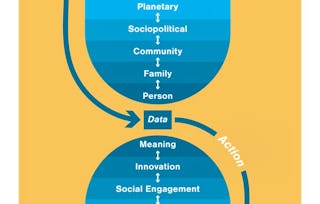This fourth of five courses examines the methodological approaches and research tools that inform our understanding of best practices in working with science teams, communities, and with data. The topics of this course include:

Social Determinants of Health: Methodological Opportunities
Saisissez l'occasion de faire des économies ! Bénéficiez de 40 % de réduction sur 3 mois de Coursera Plus et d'un accès complet à des milliers de cours.

Social Determinants of Health: Methodological Opportunities
Ce cours fait partie de Spécialisation "Social Determinants of Health: Data to Action"


Instructeurs : Daniel J. Pesut, Ph.D., RN, FAAN
Inclus avec
Compétences que vous acquerrez
- Catégorie : Community Health
- Catégorie : Public Health
- Catégorie : Research Methodologies
- Catégorie : Social Determinants Of Health
- Catégorie : Health Equity
- Catégorie : Data Analysis
- Catégorie : Data Visualization
- Catégorie : Health Informatics
- Catégorie : Health Policy
- Catégorie : Data Collection
- Catégorie : Research
Détails à connaître

Ajouter à votre profil LinkedIn
Découvrez comment les employés des entreprises prestigieuses maîtrisent des compétences recherchées

Élaborez votre expertise du sujet
- Apprenez de nouveaux concepts auprès d'experts du secteur
- Acquérez une compréhension de base d'un sujet ou d'un outil
- Développez des compétences professionnelles avec des projets pratiques
- Obtenez un certificat professionnel partageable

Il y a 5 modules dans ce cours
Obtenez un certificat professionnel
Ajoutez ce titre à votre profil LinkedIn, à votre curriculum vitae ou à votre CV. Partagez-le sur les médias sociaux et dans votre évaluation des performances.
Instructeurs


Offert par
En savoir plus sur Health Informatics
 Statut : Essai gratuit
Statut : Essai gratuitUniversity of Minnesota
 Statut : Essai gratuit
Statut : Essai gratuitUniversity of Minnesota
 Statut : Essai gratuit
Statut : Essai gratuitUniversity of Minnesota
 Statut : Essai gratuit
Statut : Essai gratuitUniversity of Minnesota
Pour quelles raisons les étudiants sur Coursera nous choisissent-ils pour leur carrière ?

Felipe M.

Jennifer J.

Larry W.

Chaitanya A.

Ouvrez de nouvelles portes avec Coursera Plus
Accès illimité à 10,000+ cours de niveau international, projets pratiques et programmes de certification prêts à l'emploi - tous inclus dans votre abonnement.
Faites progresser votre carrière avec un diplôme en ligne
Obtenez un diplôme auprès d’universités de renommée mondiale - 100 % en ligne
Rejoignez plus de 3 400 entreprises mondiales qui ont choisi Coursera pour les affaires
Améliorez les compétences de vos employés pour exceller dans l’économie numérique
Foire Aux Questions
Plus de questions
Aide financière disponible,
¹ Certains travaux de ce cours sont notés par l'IA. Pour ces travaux, vos Données internes seront utilisées conformément à Notification de confidentialité de Coursera.

